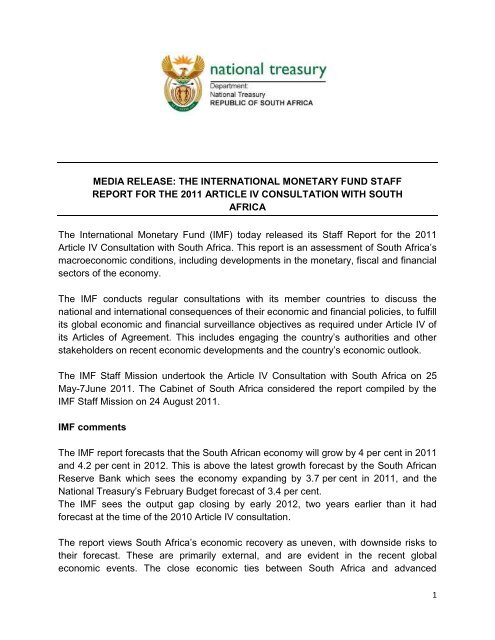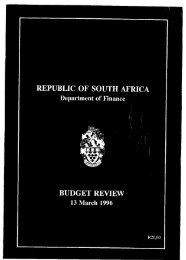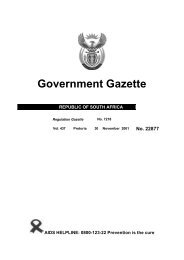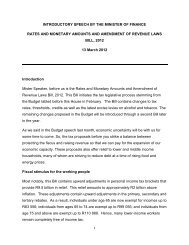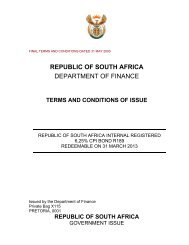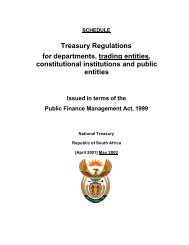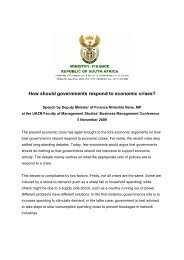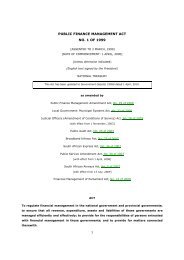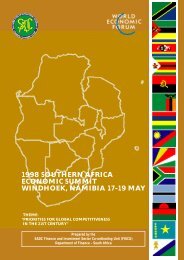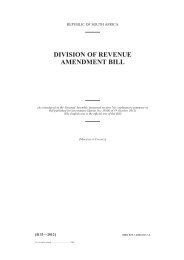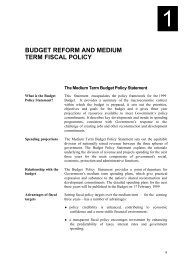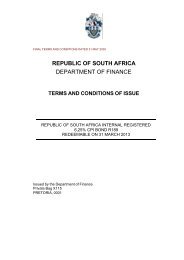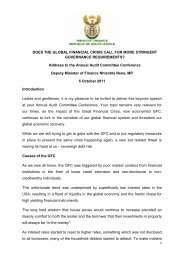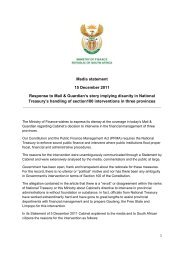THE INTERNATIONAL MONETARY FUND ... - National Treasury
THE INTERNATIONAL MONETARY FUND ... - National Treasury
THE INTERNATIONAL MONETARY FUND ... - National Treasury
Create successful ePaper yourself
Turn your PDF publications into a flip-book with our unique Google optimized e-Paper software.
MEDIA RELEASE: <strong>THE</strong> <strong>INTERNATIONAL</strong> <strong>MONETARY</strong> <strong>FUND</strong> STAFF<br />
REPORT FOR <strong>THE</strong> 2011 ARTICLE IV CONSULTATION WITH SOUTH<br />
AFRICA<br />
The International Monetary Fund (IMF) today released its Staff Report for the 2011<br />
Article IV Consultation with South Africa. This report is an assessment of South Africa’s<br />
macroeconomic conditions, including developments in the monetary, fiscal and financial<br />
sectors of the economy.<br />
The IMF conducts regular consultations with its member countries to discuss the<br />
national and international consequences of their economic and financial policies, to fulfill<br />
its global economic and financial surveillance objectives as required under Article IV of<br />
its Articles of Agreement. This includes engaging the country’s authorities and other<br />
stakeholders on recent economic developments and the country’s economic outlook.<br />
The IMF Staff Mission undertook the Article IV Consultation with South Africa on 25<br />
May-7June 2011. The Cabinet of South Africa considered the report compiled by the<br />
IMF Staff Mission on 24 August 2011.<br />
IMF comments<br />
The IMF report forecasts that the South African economy will grow by 4 per cent in 2011<br />
and 4.2 per cent in 2012. This is above the latest growth forecast by the South African<br />
Reserve Bank which sees the economy expanding by 3.7 per cent in 2011, and the<br />
<strong>National</strong> <strong>Treasury</strong>’s February Budget forecast of 3.4 per cent.<br />
The IMF sees the output gap closing by early 2012, two years earlier than it had<br />
forecast at the time of the 2010 Article IV consultation.<br />
The report views South Africa’s economic recovery as uneven, with downside risks to<br />
their forecast. These are primarily external, and are evident in the recent global<br />
economic events. The close economic ties between South Africa and advanced<br />
1
economies, particularly core euro zone countries, is a central concern given the<br />
sluggish recovery and continuing sovereign debt concerns.<br />
On the domestic side, the IMF identifies high household debt as a restraining factor to<br />
household consumption, which has been a principal driver of growth during the<br />
recovery.<br />
The prudent and countercyclical fiscal and monetary policies implemented by the<br />
Government of South Africa were commended in the report. These policies were<br />
effective in building buffers during the upswing that buttressed domestic demand during<br />
the global financial crisis and domestic recession.<br />
The report also welcomed the explicit fiscal guidelines to inform future fiscal policy<br />
formulation as outlined by the Minister of Finance in the 2011 Budget Speech. Given the<br />
IMF staff estimates of the output gap, the report recommends a tighter fiscal stance<br />
than is currently envisaged over the medium term. It raises concerns about the marked<br />
increase in the government wage bill and argues for a rebalancing in the composition of<br />
spending towards raising potential growth and enhancing public service delivery.<br />
In terms of monetary policy, the report suggests that uncertainties about the economic<br />
outlook support a delay in monetary tightening until there is clear evidence of a<br />
pronounced increase in core inflation. On the management of capital inflows, the IMF<br />
report encourages the market-based exchange rate system, but notes that South Africa<br />
faces persistent competitiveness problems reflected in, among others, the poor<br />
performance of export volumes during the recovery. The report acknowledges the low<br />
interest rate environment in advanced economies as one contributory factor to<br />
appreciation pressures and attributes the competitiveness problem equally to rising<br />
labour and other domestic costs of production.<br />
With competitiveness as a concern, rather than an overheating economy, the IMF<br />
suggests that capital flow measures such as controls are unlikely to help much, noting<br />
that the implications for government financing are likely to be significant while any<br />
benefits are likely to be transitory. As such, the IMF recommends exchange rate<br />
flexibility, further reserve accumulation and a gradual recalibration of the fiscal-monetary<br />
mix as constituting the most practical response to capital inflows in South Africa. The<br />
report concludes that gains in long-term competitiveness can only occur from reforms<br />
that control the domestic cost of production.<br />
The IMF endorses government’s focus on job creation and agrees that much faster<br />
economic growth is required to achieve the jobs targets outlined in the New Growth<br />
2
Path. The IMF staff estimates that sustained growth rate of 6-7 per cent a year is<br />
needed. Within the context of a more moderate annual growth outlook of 4 per cent,<br />
reforms to raise the labour intensity of growth are essential. Further, the IMF highlights<br />
the need for broad-based reforms to strengthen competition and competitiveness<br />
including more aggressive efforts to attract new entrants into key network industries,<br />
moderating economy real wage growth and addressing structural factors behind<br />
unemployment.<br />
The report commends the strength and resilience of South African banks and is positive<br />
about national improvements in financial regulation and supervision, and in particular,<br />
the move toward the ‘twin peaks’ regulatory and supervisory framework. The stability of<br />
South Africa’s financial sector remains a pillar of strength in today’s uncertain global<br />
environment and will be important through the current turmoil affecting financial<br />
markets.<br />
The report also notes South Africa’s ambition towards greater regional integration and<br />
recognises the impact of the financial crisis on the SACU revenue pool and the revenue<br />
and budget implications that this has had for a number of countries, particularly<br />
Swaziland.<br />
View of the South African government<br />
The South African government welcomes engagement opportunities with institutions<br />
such as the IMF, as well as others like the Organisation for Economic Cooperation and<br />
Development (OECD), and the World Bank. These organisations are important as<br />
independent evaluators of government’s economic policies.<br />
Though the government does not share all the views expressed in the IMF report, the<br />
report is a fair assessment of the economic conditions in South Africa, and will be<br />
considered, together with other similar assessments, during policy formulation by the<br />
government.<br />
Many of the issues raised by the IMF report are already reflected in the priorities and<br />
outcomes that government has set itself, including work on inclusive growth, policies<br />
aimed at accelerating job creation and measures to improve the efficiency and<br />
effectiveness of government spending.<br />
<strong>National</strong> <strong>Treasury</strong> continues to view the conservative fiscal consolidation path outlined<br />
at the time of the Budget as appropriate for the South African economy. The Budget<br />
macroeconomic forecast sees the output gap closing at the beginning of 2014, two<br />
3
years later than in the IMF report, largely as a result of differences in growth forecasts<br />
and estimates of the economy’s maximum rate of growth.<br />
Government will update its macroeconomic forecasts on 25 October 2011 when the<br />
Minister of Finance tables the 2011 Medium Term Budget Policy statement.<br />
A copy of the full Staff Report can be downloaded from the International Monetary Fund<br />
website (www.imf.org) or the <strong>National</strong> <strong>Treasury</strong> website (www.treasury.gov.za).<br />
Issued by: <strong>National</strong> <strong>Treasury</strong><br />
4


